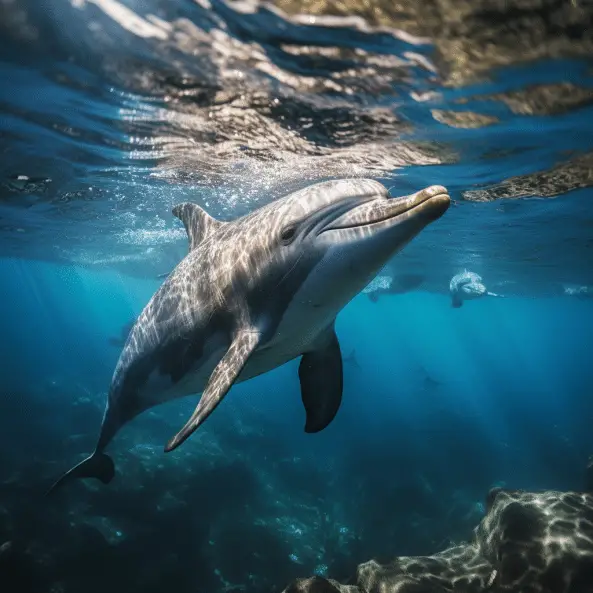Navigating the Depths: Swimming Safely with Wild Dolphins

Introduction
Is It Safe To Swim With Wild Dolphins: The allure of swimming with wild dolphins has long been a dream for many adventurers and nature enthusiasts. The idea of sharing the ocean with these intelligent, graceful creatures is undeniably enticing, promising a unique and profound connection with the natural world. However, beneath the allure lies a complex set of considerations and responsibilities, raising the question: Is it safe to swim with wild dolphins?
Dolphin-human interactions are studied. Behavior, habitat, and human tolerance vary in ocean dolphins. They require safety, ethics, ecology, and regulation.
The extensive dolphin behavior study will examine human swimmer effects. Risks and benefits of wild dolphins swimming with humans. To protect these amazing marine creatures, we will discuss responsible tourism and conservation.
Follow science, ethics, dolphin-aquatic experts, and adventurers. Our fragile ocean ecosystems and dolphins will be protected while we love nature. Respecting these intelligent and sentient beings and their environments, we will answer whether it is safe to swim with wild dolphins on this discovery voyage.

Can you swim with dolphins in wild?
Even though seawater is clean, wild dolphins carry disease. People and dolphins who are healthy may be in danger. If you don’t want to be scared, don’t swim with dolphins.
It’s amazing to swim with wild dolphins. Dolphins in the wild are amazingly smart and social. Know the rules that govern interactions.
Dolphin watching and snorkeling tours often include swimming with dolphins in many places. Professional instructors know how dolphins behave and the laws that protect both people and dolphins. Animal care that is done right can be fun and safe.
It is dangerous to swim with wild dolphins. Dolphins are illegal in this area. Do not hurt dolphins by coming up behind them quietly.
Is it safe to Swim with dolphins?
Whale and Dolphin Conservation, which is against such tours (particularly if they involve feeding), says that repeated disturbance can lead to pods abandoning feeding and breeding areas, and that there is a risk of injury from propellers.
The safety of swimming with dolphins, whether in the wild or in controlled environments such as marine parks and aquariums, depends on several factors:
Guided Tours:
Skilled leaders who stress safety and follow moral rules can make things a lot safer in the bush.These guides know how dolphins act and how to keep everyone calm.
Dolphin Species:
The species of dolphins encountered also matters. There are different kinds of dolphins. Some are friendly and curious, while others are shy or not used to people. Understanding the behavior and habits of the specific species you are swimming with is essential for safety.
Environmental Conditions:
Weather, water conditions, and the location of the encounter can influence safety. When the weather is bad or the waves are rough, swimming with dolphins can be dangerous. People who are going should be ready.
Personal Abilities:
Swimmers should have a reasonable level of comfort and proficiency in the water. It’s important to be a competent swimmer and to follow safety instructions provided by guides.
Responsible Behavior:
Safety also depends on the responsible behavior of participants. This includes following guidelines, not approaching dolphins too closely, and refraining from touching or feeding them, as this can disrupt their natural behaviors.
Lastly, it is safe to swim with dolphins as long as you do it properly and are supervised by experienced professionals who care about both the dolphins and the people who are swimming with them. To stay safe, you need to follow the rules, know how dolphins behave, and care about the environment. To enjoy these amazing sea creatures in a responsible way, you need to balance safety with morality.

Is it OK to touch wild dolphins?
Dolphins and whales are wild animals, even though they have big smiles and always seem to be in a good mood. Always remember this fact. DO NOT TOUCH the dolphins. If the dolphins want physical contact with people, they will initiate it.
In many places, it is wrong and dangerous to touch wild dolphins. Dolphins are very wild. These dolphins are not tamed or used to people like dolphins that are kept as pets. There are a few reasons why you shouldn’t touch wild dolphins:
Stress and Disruption: Dolphins are sensitive to disturbance, and approaching them too closely or attempting to touch them can cause stress. This stress can disrupt their natural behaviors, including feeding, socializing, and resting, all of which are crucial for their survival.
Safety Risks: Dolphins are strong and powerful animals. Approaching them closely or attempting to touch them can pose safety risks to humans. Dolphins may respond defensively if they feel threatened, potentially leading to accidental injuries.
Regulations: Many countries and regions have regulations in place that prohibit or restrict interactions with wild dolphins. Violating these regulations can result in fines or legal consequences.
Conservation Concerns: Touching dolphins, especially in tourist places, can hurt their populations. Repeated and prolonged contact can alter the behavior of dolphins, affect their health, and disrupt their natural habits.
It is very important to respect wild dolphins’ normal behaviors and limits. Leave wild dolphins enough space to do their thing and stay away from them.
Is it ethical to Swim with Wild dolphins?
The only way to swim with dolphins ethically is to let them behave naturally – this means not getting too close, and definitely no feeding or touching. If you’re in the water snorkelling or scuba diving and a dolphin comes over to check you out, consider yourself lucky!
The ethics of swimming with wild dolphins are a subject of debate and can vary depending on various factors, including how the interactions are conducted and the specific context. Here are some key considerations to understand the ethical aspects of swimming with wild dolphins:
Respect for the Dolphins:
When humans associate with wild dolphins, they put the animals’ comfort first. It’s important to be careful when you approach them, stay away from them, and not chase or bother them. People can stress or interrupt dolphins’ actions that are necessary for their survival.
Avoiding Harm:
Participants in these encounters should refrain from touching, riding, or feeding wild dolphins. These actions can disturb their natural behaviors, potentially harm their health, and expose them to human-borne diseases. Physical contact with wild dolphins is generally discouraged for ethical and safety reasons.
Guided Tours:
Experts in dolphin behavior and protection lead tours that help people be more moral. These guides can teach people about dolphins, make sure people behave properly, and keep dolphins from getting hurt.
Environmental Impact:
It’s important to be careful when swimming with dolphins. As examples, people should follow the rules, respect marine protected areas, and not hurt ecosystems that are already in bad shape. Ethics say that people shouldn’t mess with dolphins’ natural habitats.
Local Regulations and Guidelines:
The ethics of swimming with wild dolphins can also depend on local regulations and guidelines. Many countries and regions have specific rules in place to protect these animals and their habitats. Adhering to these regulations is a critical aspect of ethical interactions.
Educational Value:
Exploring wild dolphins ethically can teach. They can promote marine creature and habitat conservation by raising awareness.
Swimming with wild dolphins requires responsibility and respect. The main goal should be to protect dolphins and their environment while letting humans enjoy them. Swimming with wild dolphins can be ethical, educational, and conservation-focused when done this way.
Do wild dolphins play with humans?
Wild dolphins may want human connection. Many studies show that lone sociable dolphins prefer humans to their own species.
Swimming dolphins play with humans. Dolphins establish these partnerships, therefore can play differently than humans.
Smart, curious dolphins monitor swimmers, snorkelers, and vessels. This attracts dolphins to swim with humans, jump out, and ride boat bow waves. Though playful, dolphins are curious and social.
Respect dolphins’ normal patterns during interactions. Dolphins appear nice but are wild animals with unpredictable behavior. Dolphins should not be harassed by humans.
Do dolphins like swimming with humans?
Dolphins live by kissing, swimming, and tugging. Because they won’t eat, all confined dolphins master these skills.
Some social dolphins swim with humans. Subjectively, people “like” group swimming. Dolphins respond to curiosity, relationships, and situations.
Human-used dolphins swim with tourists. Dolphins may have benefited from animal tours.
Remember that dolphins are wild animals with unique requirements, behaviors, and preferences. Dolphins may like us. Dolphin contact rules should safeguard wildlife.
Dolphins’ opinions on swimming with people vary by experience. Ethics in dolphin-human relations protect habitats and activity.
Can dolphins protect you?
Many swimmers and sailors were saved by dolphins. Surfers escaped great white sharks with dolphins.
Dolphins saving people at sea has made the idea popular and touching. Dolphins have helped humans in difficult situations, but these interactions must be defined.
Social and smart, dolphins behave complexly. Water-stranded people have been seen. Not “protecting” humans, dolphins. Dolphins may be friendly and odd.
Dolphins, though rare and poorly understood, have protected humans. Dolphin reactions to human distress vary by dolphin and situation.
Dolphins are wonderful and kind, but you must understand their behavior and not use them as protection in dangerous situations.
Do dolphins protect humans from sharks?
Dolphins travel in pods, sharks alone. Others rush to save a shark-threatened pod member. Dolphins protect humans from sharks.
Many stories involve dolphins defending humans from sharks. Wild dolphin-shark interactions must be clarified.
Sharks and dolphins eat different ecosystems. Dolphins defend pods from sharks. Dolphins can herd sharks to deter them due to their agility and cooperation.
Humans cannot use dolphins as shark “bodyguards”. Dolphins fight humans. Normal sharks don’t hunt humans.
Marine life dynamics. Dolphins are smart and capable, but they cannot scientifically protect humans from sharks. Nets or cages are needed for shark-filled swimming or watersports.

Conclusion
For “Is it safe to swim with wild dolphins?” we explored complex human-dolphin interactions. Important lessons, responsibilities, and duties from this undertaking changed our view of this delicate tango between worlds.
Wild dolphin swimming is risky. Honor dolphins’ intelligence, sociality, and sentience. Dolphins, humans, and marine ecosystems suffer.
Dolphin encounters must be ethical to protect. Stop feeding them. Social, behavioral, and habitual changes can kill these animals.
Environmental and ethical tourism were emphasized. Natural connection and marine conservation must coexist. Communication, awareness, and sustainability strengthen human-dolphin relations.
It’s important to swim with wild dolphins. These beautiful animals and their home are safe because of safety measures. Respect, understanding, and conservation may help make swimming with wild dolphins safe, fun, and good for the waterways and the species.



